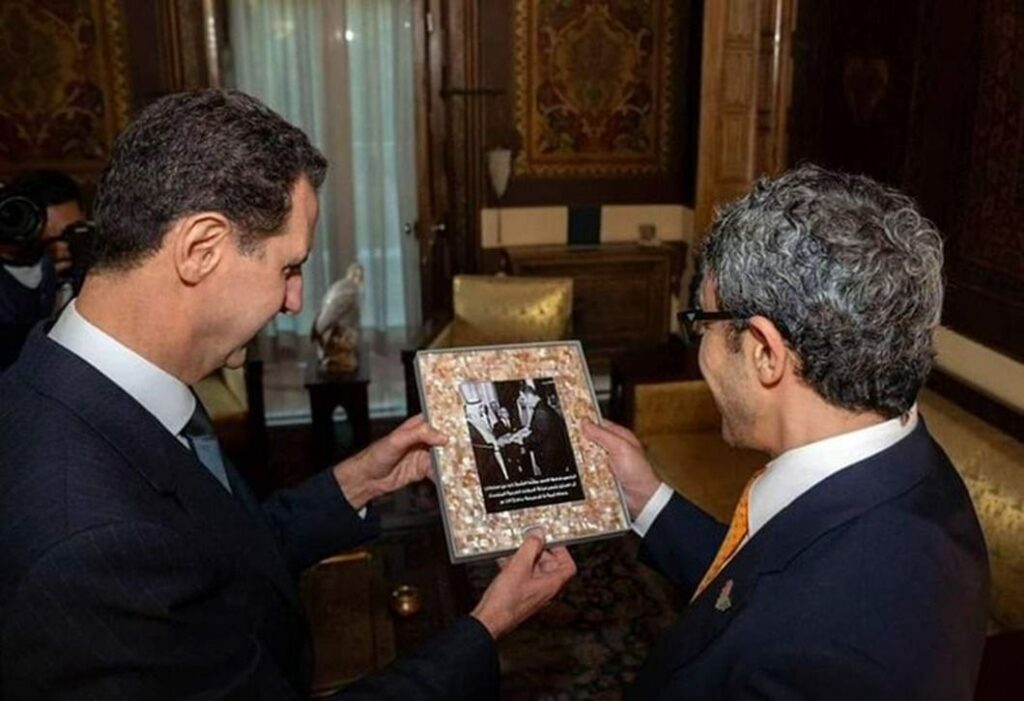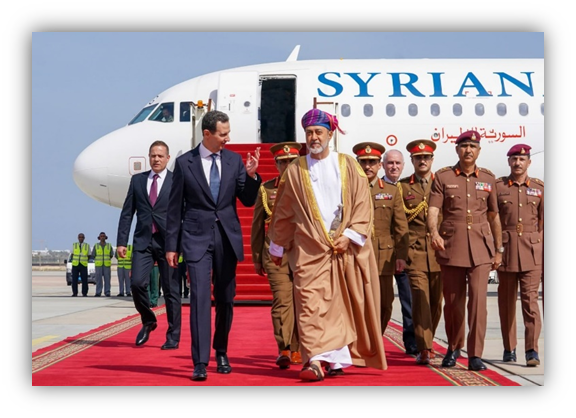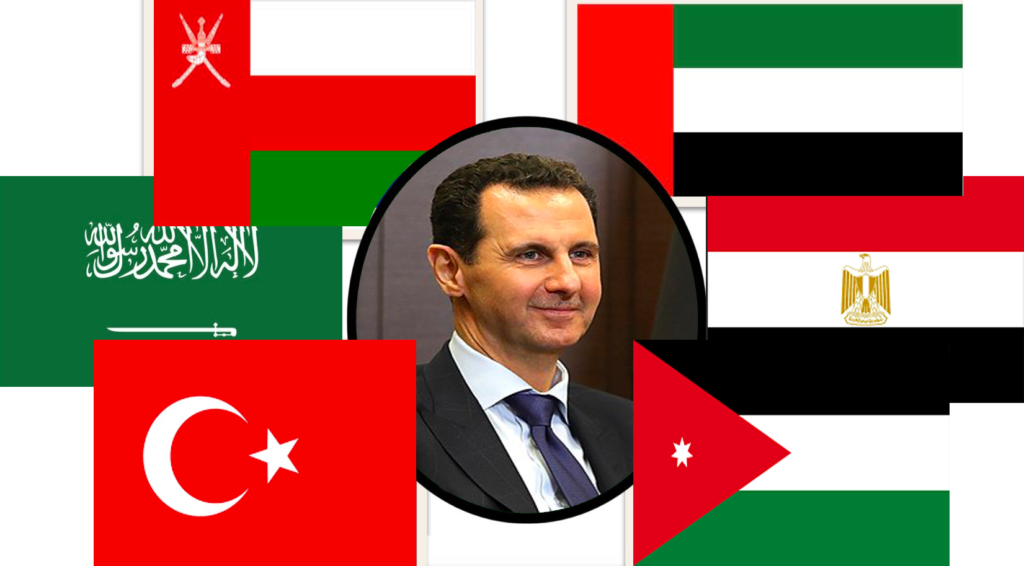The trend of the Arab and Islamic countries normalizing ties with Syria stems, first and foremost, from the interests of those countries, with an emphasis on economic interests, and not necessarily from an attempt to block or prevent a complete Iranian takeover of Syria. The Syrian interest is clear; any loophole allowing the regime to remove the sanctions and rebuild Syria will help it. In our estimation, the normalization of Arab countries with Syria will not prevent Iranian involvement and entrenchment in Syria since the Syrian commitment to Iran is greater. Still, the more Arab countries seek to invest and stimulate the Syrian economy, the more it will reduce Iran’s foothold in Syria.
In recent days, we have witnessed the agreement renewing relations between Saudi Arabia and Iran, with one of its main engines being economic interests. This agreement will probably also lead to normalization between Saudi Arabia and Syria. Regarding this issue, see the remarks made by the Saudi foreign minister on March 7: Discussions are underway intending to return Syria to full membership in the Arab League.
In October 2021, we published an article titled:
In the article, we detailed how Syrian President Bashar Assad lost Syrian dominance in the regional and international arenas in favor of Iran and Hezbollah following their intervention in the civil war in Syria and following Russia’s intervention in 2015. As you may recall, the main goal of the latter was to preserve Bashar Assad’s regime in light of its being part of the axis of resistance and an important part of the Iranian corridor for the transfer of weapons from Iran through Syria and Lebanon into the hands of Hezbollah.
From the end of 2017, and once it was understood that control was slowly returning to the Assad regime, Russia and Iran began to compete for control of Syria, mainly regarding their economic, military, and strategic interests. At the same time, Iran and Hezbollah are interested in and working to locate as many military outposts as possible on Syrian territory to serve the interests of the Iranian corridor and the interest of building a geographical front against Israel.
On the one hand, we have seen how Bashar Assad is committed to his Russian, Iranian, and Hezbollah saviors. On the other hand, he is not interested in presenting his country on a silver platter serving as a marionette in the struggle between Russia and Iran on Syria’s resources.
Syria, which lost its status among the entire Arab community, especially after its suspension from the Arab League in 2012, following the civil war and Assad’s activities against his own people, seeks to regain its status among the Arab international community and return to being the leader of the axis of resistance against Israel and the United States. Moreover, re-admission to the Arab League would be the whitewashing of the Syrian dictatorship, the genocide, and the killing of innocent people.

In May 2021, Bashar Assad was re-elected for a second term as President of Syria. Since then, we have seen how he has no real ability to change the state of Russian involvement (which has continued since the start of the war against Ukraine in February 2022) or the state of the radical Shiite axis led by Iran in Syria, which would allow him to return as the sole leader of Syria. Syria relied on Russian and Iranian support for its reconstruction.
A summit was held in Algiers in November 2022, in which Syria did not participate in light of its suspension. This was also in light of the disapproval of Saudi Arabia, Egypt, and Qatar in its participation. The summit ended by noting that “Arab countries play a leading collective role in contributing to efforts to reach a political solution to the Syrian crisis.” In recent months we have witnessed a new tendency featuring countries from the Arab world approaching Syria on economic and political grounds.
Does this indicate a tendency toward reducing the influence of Iran and Hezbollah in Syria to remove Assad from the embrace of the axis of resistance?
Currently, the US administration is opposed to promoting normalization with Syria. The American sanctions imposed on the Syrian regime are the main obstacle to normalization and the ability of the various countries to promote economic transactions. Even the earthquake in Syria (February 2023) did not advance this issue. The EU, for its part, also rejects normalization with Syria to push it into serious negotiations to reach a political solution.
An Arab country that is not one of the supporters of normalization with Syria is Qatar. The Emir of Qatar, Sheikh Tamim bin Hamad al-Thani, rejected any attempt to ignore the tragedy inflicted on the Syrian people, the continuity of the regime’s policy of oppression, and the rejection of any political approach to a solution. Therefore, as far as Qatar is concerned, Syria should continue to be excluded from the Arab League.
The main countries that have promoted normalization in an attempt to draw closer to Syria are Turkey and the United Arab Emirates:
Turkey, which had supported the opposition organizations striving to replace Assad’s regime in Syria since 2011, changed its policy in light of the U.S. support for the SDF forces, the Syrian Democratic Forces, which included ethnic minorities (Kurds, Arabs, Armenians, Turkmen, Circassians, and others) that Turkey does not consider to be entitled to any independence. Established in October 2015, this alliance was designated to combat ISIS forces.
Thus, Turkey worked to reach understandings with Russia, the most important of which was that they no longer sought a regime change in Syria in exchange for preventing the establishment of a Kurdish entity on the Turkish-Syrian border. This is in addition to Turkey’s economic, social (such as the problem of the Syrian refugees in Turkey, whose number is estimated at 3.5 million people), and security issues. Added to this was a meeting in December 2022 between the defense ministers and intelligence chiefs of Turkey and Syria held in Russia, which led to Turkey’s postponement of the military operation against the SDF. This was after Turkey realized that cooperation with Russia and the Syrian regime was a better option, offering to help the Syrian regime regain control of the areas it had lost to the SDF. In return, Syria would prevent the establishment of Kurdish autonomy, especially in northern and northeastern Syria.
Moreover, before the June 2023 elections expected in Turkey, President Recep Tayyip Erdogan is working to change his foreign policy, including improving relations with Saudi Arabia, the United Arab Emirates, Egypt, Iran, and even Israel. Undoubtedly, the earthquake in northern Syria and southern Turkey in February 2023 reinforced Erdogan’s concerns regarding the results of the elections expected in June 2023.
Another country that has pushed toward normalization with Syria is the United Arab Emirates, for which the civil war in Syria was an opportunity to isolate Iran as a supporter of the Syrian regime and, therefore, supported the Syrian opposition and severed its relations with Syria in 2012. The UAE’s position changed in December 2018, when it reopened its embassy in Damascus, as part of a change in its understanding of the situation in Syria and its desire to influence the containment of Iran as part of its perception that it is an element in the war on terror.
In early 2020, the first public phone call occurred between Abu Dhabi’s then-Crown Prince Mohammed bin Zayed and Bashar Assad. In November 2021, UAE Foreign Minister Abdullah bin Zayed made his first visit to Damascus in a decade. In March 2022, Bashar al-Assad paid his first visit to Abu Dhabi since the outbreak of the Syrian civil war. In December 2022, Abdullah bin Zayed visited Damascus as part of his mediation efforts with Russia to prevent a Turkish military operation.
On the one hand, the UAE’s interest is in creating economic opportunities and leading to the stability of the Syrian regime in coordination with the Turkish government, as well as preventing an Iranian expansion that could also have implications for the UAE in the Persian Gulf.

Saudi Arabia, at this stage, has reservations about the tendency of normalization with the Syrian regime and, together with Egypt and Qatar, prevented Syria from participating in the Arab League summit in Algiers in November 2022, claiming that Iran’s involvement in Syria prevents it from returning to the Arab world.
Despite this, in January 2023, Saudi Foreign Minister Faisal bin Farrakhan made a statement referring to the normalization efforts vis-à-vis the Syrian regime that a political solution to the civil war that has been ongoing for the past 12 years must be sought.
It is clear that Saudi Arabia, which is fighting the Houthis, the Iranian proxy in Yemen, will change its approach to Syria following the understanding that normalization with Syria will limit Iranian influence in Syria itself and in the Persian Gulf region and Yemen.
Egypt was coordinated and aligned with Saudi Arabia’s position: i.e., waiting for normalization and not opposing in principle. In a joint statement released after the meeting of the Monitoring and Political Consultation Committee between Egypt and Saudi Arabia in Cairo in mid-December 2022, the two countries noted that they supported a political solution in Syria in accordance with Resolution 2254 (the UN Security Council resolution calling for a political solution in Syria), and the rejection of all threats of military operations affecting Syrian soil. In this context, they rejected Turkey’s desire for a military operation. Egypt was in favor of returning Syria to the League of Arab States in early 2022 but ultimately aligned itself with the Saudi position that opposed it.
Jordan’s position has changed many times since the beginning of the Syrian revolution in 2011. As you may recall, Jordan gave the Syrian opposition elements a home. The joint international operations room was established on its territory in 2012, supporting the Syrian opposition factions, the “MOC.” Since 2021, Jordan has been promoting normalization with Syria due to economic, security, and social circumstances and interests. On Jordanian territory, there are about 700,000 Syrian refugees who constitute a heavy burden on Jordanian infrastructure in a country where the economic situation is already difficult, as well as Jordan’s desire to try to prevent drug smuggling in its direction and to return exports from Jordan to Syria ( In this context, see the article published by us in November 2021.
Jordan and Syria on the Road to Normalizing Relations – Background and Interests
Syria renewed its relations with Hamas, mediated by Iran and Hezbollah, in October 2022. As a result, a Hamas delegation arrived in Syria to meet with Bashar Assad as part of the resistance axis, made up of Iran, Hezbollah, Syria, the Islamic Jihad, and Hamas. Relations between Syria and Hamas ran aground at the beginning of the Syrian civil war in 2011, when Hamas leaders openly supported the Syrian opposition, leading Hamas to evacuate its headquarters in Damascus in 2012.
On February 25, 2023, during the 34th conference of the Union of Arab Parliament held in Baghdad, Union President Muhammad al-Halbousi called on Arab countries to adopt a final decision to return Syria “to its Arab environment, to realize its Arab, regional, and international role effectively, and to take serious action for its stability, the rehabilitation of infrastructure, and the return of Syrian refugees to their homeland.” President Assad stressed the fraternal relations between Syria and Iraq and that the geographical partnership between the two countries makes them share similar challenges and common interests.
On February 26, 2023, a delegation from the Union of the Arab Parliament arrived in Damascus and met with President Assad. The delegation included the heads of the parliaments of Iraq, the UAE, Jordan, Libya, Egypt, and the Palestinian Authority, as well as representatives from Oman and Lebanon. It was the first visit by a senior Egyptian official to Syria since the civil war began in 2011.

It should be noted that on February 20, 2023, Assad paid a political visit to the Sultanate of Oman in the Persian Gulf. The official announcement stated that the two countries agreed on deepening their relations, hoping that the normalization of relations between Syria and the Arab countries would be restored and that Oman would provide as much aid as possible following the earthquake.
On February 27, Egyptian Foreign Minister Sameh Shoukry arrived in Damascus for a meeting with President Assad. At the meeting, he sent a message from Egyptian President Abdel Fattah el-Sisi, confirming Egypt’s solidarity with Syria and its willingness to continue supporting the Syrians in dealing with the effects of the earthquake. Minister Shoukry believed the relations between Syria and Egypt were essential in defending Arab countries and stressed that Egypt would always help Syria in any way it could.
The Syrian regime is trying to take advantage of the February 2023 earthquake by attempting to lift the US sanctions and, simultaneously, is accusing the international community of not providing humanitarian aid while calling for the sanctions to be lifted.
Despite the earthquake, UN reports state that 70 percent of Syrians need economic, medical, and humanitarian assistance and that 9 million Syrians are on the verge of starvation after 12 years of bloody civil war. Some 18 million Syrians live in abject poverty and lack medications. Syria lives under a strict regime of sanctions, and the regime has developed an economic alternative stemming from extensive smuggling and drug trafficking, especially of the Captagon drug.
In conclusion, the Syrian regime is trying to promote normalization with Arab and Islamic countries. As noted, Turkey is promoting an agreement allowing Syria to advance its reconstruction. Vis-à-vis the Arab states, there is an interest in normalization, and in return, the regime will lift the blockade from areas still occupied by opposition elements. The Syrian regime is weak, mainly economically, and is desperate for normalization to begin in order to rehabilitate the economy through industry, import and export trade, the rehabilitation of its water, electricity, and sewage infrastructures, as well as its health and education systems.
The normalization trend of Arab and Islamic countries with Syria stems first and foremost from the interests of those countries, with an emphasis on economic interests, and not necessarily from an attempt to block or prevent a full Iranian takeover of Syria. The Syrian interest is clear, and any loophole allowing the regime to lift the sanctions and rebuild Syria will help. In our view, the normalization of Arab countries with Syria will not prevent Iranian involvement and entrenchment since the Syrian commitment to Iran is greater. Still, the more the Arab countries seek to invest and stimulate the Syrian economy, the more they will do toward reducing Iran’s foothold in Syria.






